10+ Kindergarten Lesson Examples to Download
As a kindergarten teacher, you are given the noble task of preparing the young children of your community for the future ahead of them. In order to do so, you must be able to provide them with relevant kindergarten-level lessons that will not only give them a worthwhile learning experience but will also enable them to become vital assets in the community once they grow into adults. In this article, we have provided lesson examples and templates that can help you in coming up and planning the lessons that you will be teaching to kindergarten pupils.
1. Alphabet Kindergarten Lesson
The ABCs of a child is considered as their building blocks in order to become literate individuals. As early as kindergarten, they should be able to easily recognize each of the letters of the alphabet even if it is in order or not as well as the distinct sounds or pronunciation of each of the letters. As soon as you start teaching your pupils about the alphabet, ensure that it is fun and you will be able to do so with the help of this alphabet kindergarten lesson that also enables your pupils to have fun even while learning the alphabet.
2. Communication Kindergarten Lesson
As soon as your kindergarten pupils have already mastered their ABCs, it is now easy for you to teach them the basic communication skills that they must already learn and master at a very young age. Basic communication skills include reading, writing, speaking, and listening. These communication skills are necessary in order for effective communication to take place. Humans are naturally social beings, and in order to avoid any confusion and misunderstandings in the future, young children must already know how to communicate well in all forms and ways regardless of their young age.
3. Elements in Music Kindergarten Lesson
Music provides various benefits to a young child, particularly during its formative and development years. A child can acquire academic achievement as one of the benefits they can get through music lessons, but aside from that, it can also generally affect the child’s overall growth and development. If a child is exposed to music during his or her early development, it ignites all areas and skills, such as intellectual, motor, language, social, emotional, and literacy, that makes the child well-developed and school-ready.
4. Healthy Eating Kindergarten Lesson
In their age, kindergarten pupils would really choose delicious food over healthy ones—and by delicious, it means sweets, fast foods, and junk foods in general. This healthy eating kindergarten lesson enables you to provide the flexibility that your pupils need when learning about healthy eating. Through this lesson, your pupils will finally be able to make healthy choices and changes eventually, understand that their health is one of the wealth that they can easily acquire at their young age, and engage in different healthy eating experiences.
5. Mathematics Kindergarten Lesson
Teaching math skills to your kindergarten children enables them to proceed and succeed in elementary school until they finally get to be in a university. The math skills they learn in their kindergarten years serve as their foundation that helps them build up the necessary skills needed to proceed to advanced mathematics in high school and up until college. To make it possible for young children to be learning mathematics at a remarkable rate, you may make use of this mathematics kindergarten lesson provided that includes activities that enables you to apply basic math concepts and teach math skills even in their normal childhood activities.
6. Nursery Rhymes Kindergarten Lesson
In teaching nursery rhyme lessons to kindergarten pupils, you will help them develop an ear for your language. It is also through learning nursery rhymes that your pupils will have their spatial intelligence developed. Aside from that, most nursery rhymes also contain moral lessons. Teaching nursery rhymes is an avenue where your kindergarten pupils have fun while still acquiring phonemic awareness, which is a factor of reading success.
7. Primary Colors Kindergarten
Aside from the ABCs and 123s, it is also a must for young children to get acquainted and eventually master the primary colors that they should at least learn even at their young age. Primary colors consist of red, yellow, and blue. Through this kindergarten lesson that is all about learning the primary colors, your pupils will be able to have the most basic knowledge about colors that enables them to easily describe the things they see around them.
8. Principles of Art and Design Kindergarten Lesson
Famous handicraft company, Crayola LLC, had come up with this lesson that helps teachers in teaching the principles of art from kindergarten up until the sixth grade. This art-focused lesson enables the teachers to extend their pupils’ learning as well as enhance their academic skills. Even if this is all about the arts, it has been proven that learning experiences that are integrated with the arts had made it possible for kindergarten children in developing a full and wide range of skills that helped understand non-arts-related subjects such as mathematics, science, and English.
9. When I Grow Up Kindergarten Lesson
When you were still a kid, one of the most common things you were asked about was “What do you want to become when you grow up?” And like most kids, you probably have difficulty in answering because, like most kids again, you were not given the opportunity to explore the possible career paths when you were still young. Now that you are a kindergarten teacher, make use of this kindergarten lesson that enables you to provide an opportunity for the leaders for the next generation where they will not only be able to determine what they really want to become but they will also be able to experience and explore other paths that can be helpful when they have to decide for their own selves in the near future.
10. Writing Kindergarten Lesson
Writing is one of the basic communication skills that kindergarten pupils must learn most especially in their formative years. Being in school involves a lot of activities that involve writing such as homework and exam. If your pupils still do not have the knowledge and skill on how to write effectively, it will also be difficult for you to assess on what and how they have understood the lesson they were taught about for a particular class period.
10+ Kindergarten Lesson Examples to Download
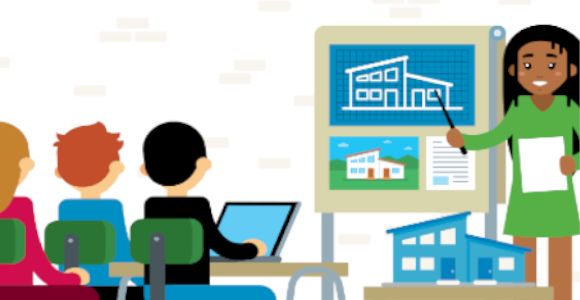
As a kindergarten teacher, you are given the noble task of preparing the young children of your community for the future ahead of them. In order to do so, you must be able to provide them with relevant kindergarten-level lessons that will not only give them a worthwhile learning experience but will also enable them to become vital assets in the community once they grow into adults. In this article, we have provided lesson examples and templates that can help you in coming up and planning the lessons that you will be teaching to kindergarten pupils.
1. Alphabet Kindergarten Lesson
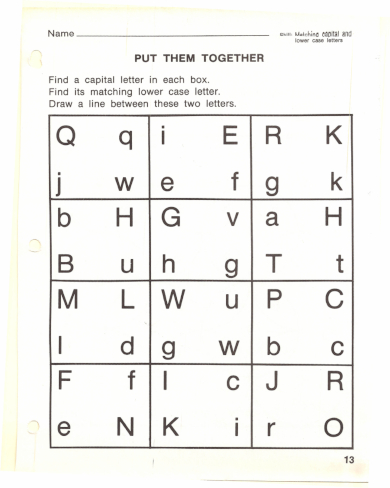
robeson.k12.nc.us
Details
File Format
PDF
Size: A4 & US
The ABCs of a child is considered as their building blocks in order to become literate individuals. As early as kindergarten, they should be able to easily recognize each of the letters of the alphabet even if it is in order or not as well as the distinct sounds or pronunciation of each of the letters. As soon as you start teaching your pupils about the alphabet, ensure that it is fun and you will be able to do so with the help of this alphabet kindergarten lesson that also enables your pupils to have fun even while learning the alphabet.
2. Communication Kindergarten Lesson
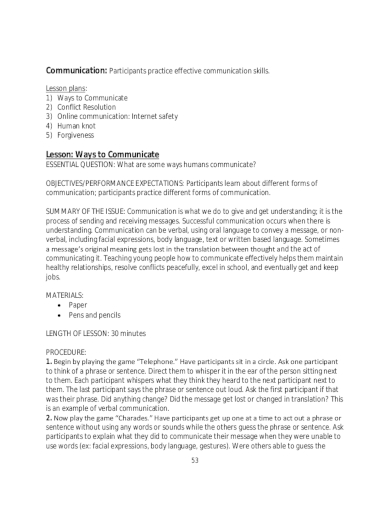
sdcda.org
Details
File Format
PDF
Size: A4 & US
As soon as your kindergarten pupils have already mastered their ABCs, it is now easy for you to teach them the basic communication skills that they must already learn and master at a very young age. Basic communication skills include reading, writing, speaking, and listening. These communication skills are necessary in order for effective communication to take place. Humans are naturally social beings, and in order to avoid any confusion and misunderstandings in the future, young children must already know how to communicate well in all forms and ways regardless of their young age.
3. Elements in Music Kindergarten Lesson
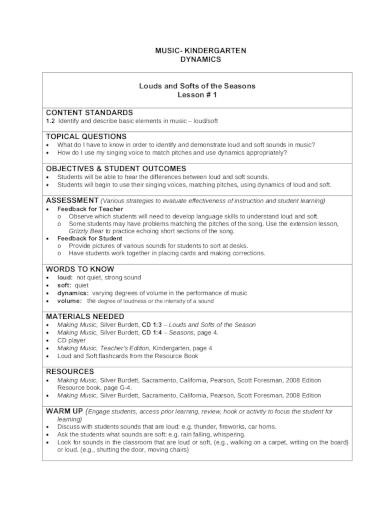
reddingschools.net
Details
File Format
PDF
Size: A4 & US
Music provides various benefits to a young child, particularly during its formative and development years. A child can acquire academic achievement as one of the benefits they can get through music lessons, but aside from that, it can also generally affect the child’s overall growth and development. If a child is exposed to music during his or her early development, it ignites all areas and skills, such as intellectual, motor, language, social, emotional, and literacy, that makes the child well-developed and school-ready.
4. Healthy Eating Kindergarten Lesson
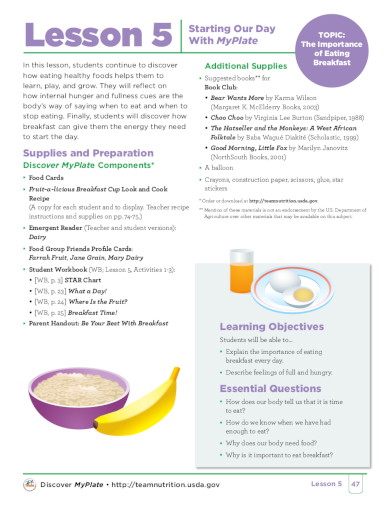
fns-prod.azureedge.net
Details
File Format
PDF
Size: A4 & US
In their age, kindergarten pupils would really choose delicious food over healthy ones—and by delicious, it means sweets, fast foods, and junk foods in general. This healthy eating kindergarten lesson enables you to provide the flexibility that your pupils need when learning about healthy eating. Through this lesson, your pupils will finally be able to make healthy choices and changes eventually, understand that their health is one of the wealth that they can easily acquire at their young age, and engage in different healthy eating experiences.
5. Mathematics Kindergarten Lesson
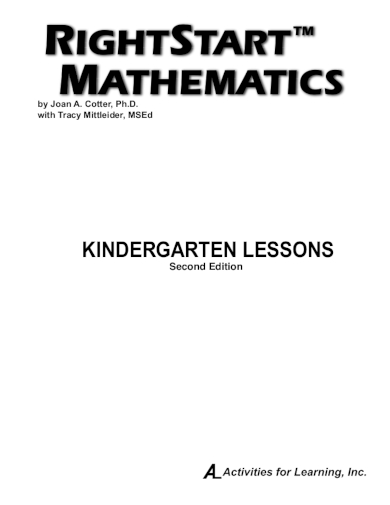
rightstartmath.com
Details
File Format
PDF
Size: A4 & US
Teaching math skills to your kindergarten children enables them to proceed and succeed in elementary school until they finally get to be in a university. The math skills they learn in their kindergarten years serve as their foundation that helps them build up the necessary skills needed to proceed to advanced mathematics in high school and up until college. To make it possible for young children to be learning mathematics at a remarkable rate, you may make use of this mathematics kindergarten lesson provided that includes activities that enables you to apply basic math concepts and teach math skills even in their normal childhood activities.
6. Nursery Rhymes Kindergarten Lesson
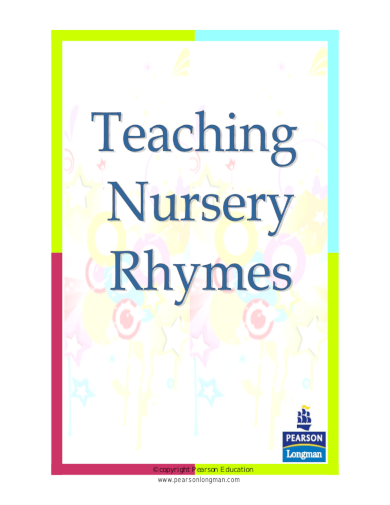
pearsoned.com
Details
File Format
PDF
Size: A4 & US
In teaching nursery rhyme lessons to kindergarten pupils, you will help them develop an ear for your language. It is also through learning nursery rhymes that your pupils will have their spatial intelligence developed. Aside from that, most nursery rhymes also contain moral lessons. Teaching nursery rhymes is an avenue where your kindergarten pupils have fun while still acquiring phonemic awareness, which is a factor of reading success.
7. Primary Colors Kindergarten
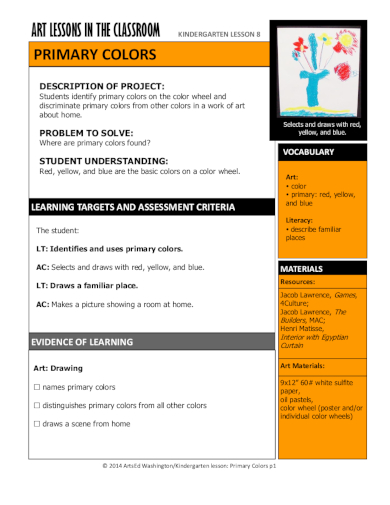
artsedwashington.org
Details
File Format
PDF
Size: A4 & US
Aside from the ABCs and 123s, it is also a must for young children to get acquainted and eventually master the primary colors that they should at least learn even at their young age. Primary colors consist of red, yellow, and blue. Through this kindergarten lesson that is all about learning the primary colors, your pupils will be able to have the most basic knowledge about colors that enables them to easily describe the things they see around them.
8. Principles of Art and Design Kindergarten Lesson
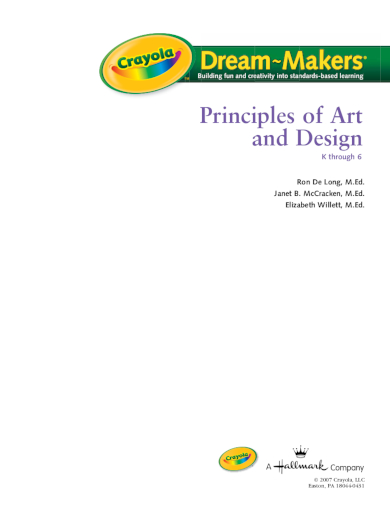
crayola.com
Details
File Format
PDF
Size: A4 & US
Famous handicraft company, Crayola LLC, had come up with this lesson that helps teachers in teaching the principles of art from kindergarten up until the sixth grade. This art-focused lesson enables the teachers to extend their pupils’ learning as well as enhance their academic skills. Even if this is all about the arts, it has been proven that learning experiences that are integrated with the arts had made it possible for kindergarten children in developing a full and wide range of skills that helped understand non-arts-related subjects such as mathematics, science, and English.
9. When I Grow Up Kindergarten Lesson
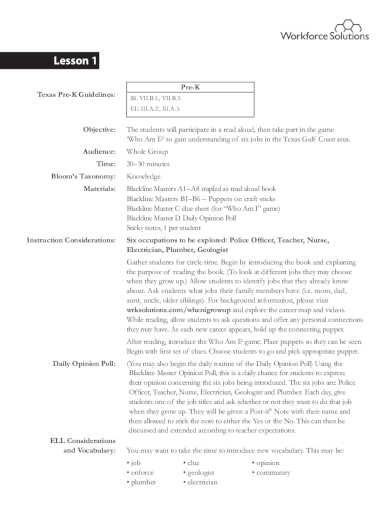
wrksolutions.com
Details
File Format
PDF
Size: A4 & US
When you were still a kid, one of the most common things you were asked about was “What do you want to become when you grow up?” And like most kids, you probably have difficulty in answering because, like most kids again, you were not given the opportunity to explore the possible career paths when you were still young. Now that you are a kindergarten teacher, make use of this kindergarten lesson that enables you to provide an opportunity for the leaders for the next generation where they will not only be able to determine what they really want to become but they will also be able to experience and explore other paths that can be helpful when they have to decide for their own selves in the near future.
10. Writing Kindergarten Lesson
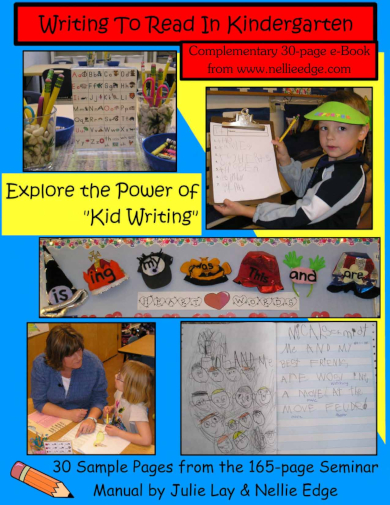
iss.k12.nc.us
Details
File Format
PDF
Size: A4 & US
Writing is one of the basic communication skills that kindergarten pupils must learn most especially in their formative years. Being in school involves a lot of activities that involve writing such as homework and exam. If your pupils still do not have the knowledge and skill on how to write effectively, it will also be difficult for you to assess on what and how they have understood the lesson they were taught about for a particular class period.

